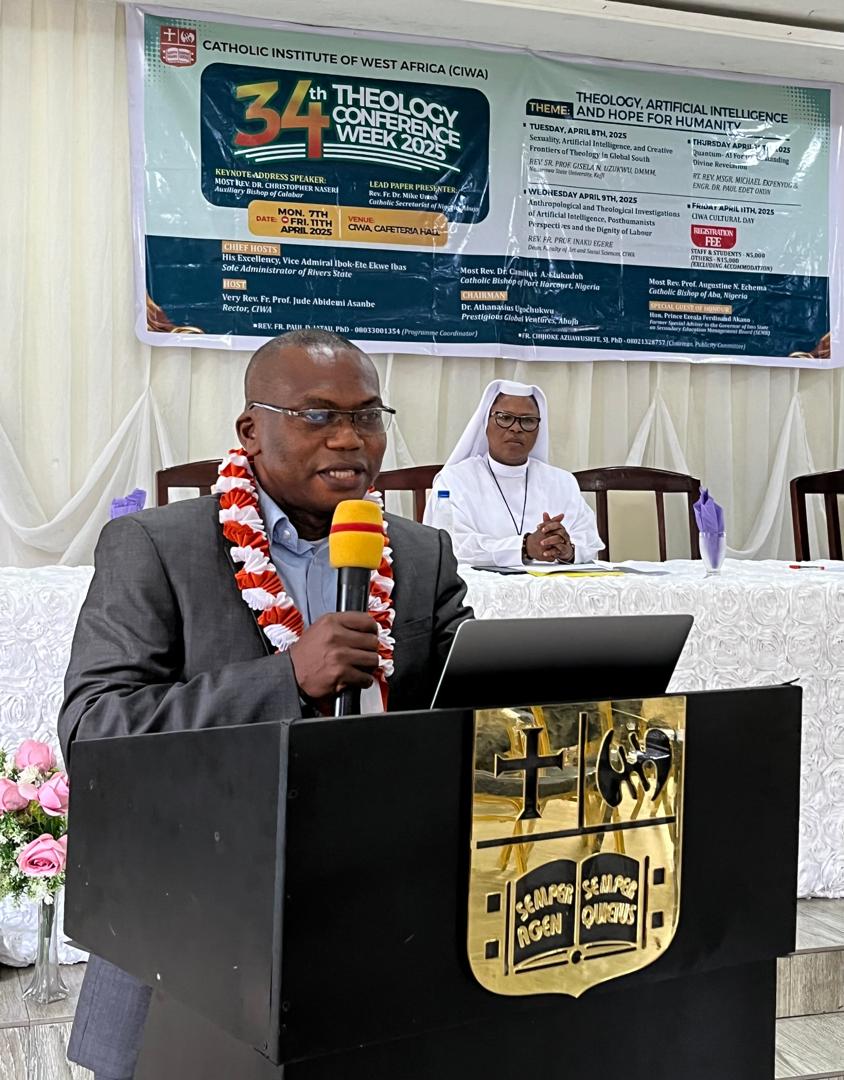From galileo galilei to ai, doubts have never been absent — yet we are *imago dei, not imago algorithmi, says prof. egere of ciwa
—April 10, 2025

Port Harcourt, Nigeria – April 9, 2025 / Fr. Okhueleigbe Osemhantie Ã
At a moment when the world teeters between awe and anxiety over the ascendancy of Artificial Intelligence (AI), Revd Fr. Prof. Inaku K. Egere of the Catholic Institute of West Africa (CIWA) has issued a rousing theological and anthropological response — a bold summons to the Church, the academy, and society at large to recover the foundational dignity of the human person, created imago Dei, in the face of mechanized modernity.
Presenting a landmark paper at the 34th CIWA Theology Conference Week, themed “Theology, Artificial Intelligence and Hope for Humanity,” Prof. Egere titled his address:
“Anthropological and Theological Investigations of Artificial Intelligence, Posthumanist Perspectives, and the Dignity of Human Labour.”
What emerged was no less than a magisterial confrontation with the digital zeitgeist — an intellectual and spiritual reaffirmation that while AI stands as a monument to human creativity, it must always remain servant, not sovereign, in a world fashioned by God and entrusted to beings endowed with soul and conscience.
“Artificial Intelligence is not imago Dei. It is imago humanis — a reflection of our labour, not our soul,” Egere declared, riveting his audience in profound stillness.
Drawing extensively from Joseph Ratzinger (Pope Benedict XVI), Pope Francis, and magisterial documents ranging from Gaudium et Spes to Caritas in Veritate, Egere shattered the presumed opposition between theology and technology. Rather than rivals, he cast them as “Siamese twins” — distinct yet destined for synergy, not schism. Echoing Ratzinger’s conviction that the rational structure of the universe points to the divine Logos, Egere reminded all:
“The world is intelligible because it is the fruit of the Logos.”
In a masterstroke of theological vision, Egere anthropomorphized AI not as a threat, but as a mirror of humanity’s God-given vocation to co-create — grounding his insights in Genesis 1:28 and Pope John Paul II’s Laborem Exercens. Yet he offered a grave warning: the seductive currents of posthumanism and transhumanism threaten to distort the Christian vision, reducing the human person to a self-optimizing machine, or worse, a disposable upgrade in the algorithmic chain of evolution.
“We are not machines aspiring to consciousness. We are souls summoned to communion,” he insisted.
Egere sharply critiqued the emergence of secular anthropologies propagated by AI platforms like ChatGPT — descriptions of humanity increasingly void of soul, moral depth, or divine origin. This, he warned, signals not progress but peril: the substitution of mystery with mechanism, and conscience with code.
Anchored in the philosophical and theological foundations of St. Augustine, St. Thomas Aquinas, Boethius, and Karl Rahner, Egere reasserted the perennial truth of the Church’s anthropology: man is the only creature on earth that God has willed for its own sake. Therefore, human work — including the creation of AI — finds its meaning only in service to the integral dignity of the person and the common good.
Rather than demonize AI, Egere called for a liturgical, ethical, and pastoral discernment of its place in society — especially in labour, economics, and culture. Citing Dignitas Infinita and Fratelli Tutti, he urged that ethics must not trail behind technological advancement, and that no algorithm can supplant the sacred human need for encounter, meaning, and solidarity.
“Our future must not be coded by data alone, but shaped by conscience,” he remarked, with prophetic urgency.
He drew attention to the growing global concern over AI’s role in deskilling the poor, perpetuating digital colonization, and weaponizing misinformation. In response, he called for justice-driven policies and robust ecclesial advocacy to ensure that the human person — not the machine — remains the measure of all progress.
Prof. Egere’s lecture is already being hailed as one of the most comprehensive and compelling Catholic reflections on Artificial Intelligence in contemporary African theological scholarship. With intellectual dexterity, he fused biblical theology, technological insight, moral reasoning, and sociocultural analysis into a single compelling vision.
In his final plea, Egere exhorted the Church and society to resist an AI-driven future that forgets the spiritual grandeur of the human being.
“We must resist any AI future that forgets that humans are not tools — we are temples,” he concluded to sustained and heartfelt applause.
Related News
September, 07 2025
Ciwa gets new rector
Ciwa gets new rector
July, 08 2025
*the catholic church in nigeria marks years of service amidst mourning*
*the catholic church in nigeria marks years of service amidst mourning*
June, 15 2025
Bishop gerald musa unveils a new vision of evangelisation through sacred imagery at signis africa 2025
Bishop gerald musa unveils a new vision of evangelisation through sacred imagery at signis africa 2025
June, 15 2025
Prof. B. A. C. obeifuna hails ciwa's outstanding scholarship at SIGNIS africa conference
Prof. B. A. C. obeifuna hails ciwa's outstanding scholarship at SIGNIS africa conference
June, 03 2025
Ciwa comweek 2025: a week draped in grandeur, symbolism and spirit
Ciwa comweek 2025: a week draped in grandeur, symbolism and spirit
Upcoming Events
No Upcoming Event posted